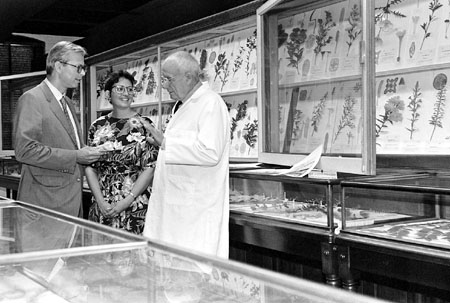Richard Schultes, medicinal plant expert, dead at 86

Richard Evans Schultes, the Edward C. Jeffrey Professor of Biology Emeritus and renowned expert on medicinal uses of plants, died April 10 in Boston at age 86.
Schultes is considered by many the father of modern ethnobotany – the study of native people’s uses of locally available plants. He was known for his wide travels through the Amazon collecting plants and talking with local people. In 1992, he received the gold medal from the Linnean Society of London, considered botany’s top honor.
Schultes first came to Harvard as an undergraduate and stayed through his graduate years. He received an A.B. in 1937, an A.M. in 1938, and a Ph.D. in 1941.
Schultes’ fieldwork, conducted mostly in the Colombian Amazon beginning in 1941, made him a leading voice in the field and one of the first, in the 1960s, to warn about destruction of the rainforests and the disappearance of their native people.
“I think one of the things his work did that previous work didn’t was he brought in a scientific background. He tried to look at the [plants’ active] compounds, at their biology and biochemistry,” said Donald Pfister, the Asa Gray Professor of Systematic Botany and curator of the Farlow Library and Herbarium.
Before joining Harvard’s professorial ranks, Schultes served in various positions at the Harvard Botanical Museum. He was a research associate from 1941 to 1953, curator of the Orchid Herbarium of Oakes Ames from 1953 to 1958, curator of economic botany from 1958 to 1985, executive director from 1967 to 1970, and director from 1970 to 1985.
He became a professor of biology at Harvard in 1970, the Paul C. Mangelsdorf Professor of Natural Sciences in 1973, the Edward C. Jeffrey Professor of Biology in 1980, and became the Edward C. Jeffrey Professor of Biology Emeritus in 1985.
Schultes’ adventurous travels in pursuit of science spawned books and articles, including “One River” in 1996 by Wade Davis, a student of Schultes. Another student, Mark Plotkin, followed in Schultes’ footsteps, writing a popular account of his own travels in “Tales of a Shaman’s Apprentice,” published in the early 1990s.
Schultes himself wrote 10 books and hundreds of scientific articles. In addition to being an authority on the medicinal uses of plants, he became a leading authority on rubber-producing plants during World War II, at the request of the U.S. government. He was a member of numerous scientific societies, the editor of botanical journals, and the recipient of many honors.
Pfister, who knew Schultes as a senior faculty member, said his demeanor was somewhat contrary to the “swashbuckling” image his scientific travels gave him. Pfister described Schultes as a “very charming and kind man” who was courteous to both senior and junior people. Having spent much of his career at Harvard and having completed both graduate and undergraduate degrees at Harvard, Pfister said Schultes felt very strongly that Harvard should be the best in everything.
“I saw him as a very senior and very mature member of the department,” Pfister said. “He always wore a lab coat, he always wore a red tie and he was fiercely Harvard.”
Schultes is survived by his wife, Dorothy Crawford McNeil, and their three children: Richard Evans Schultes II, Alexandra Ames Schultes Wilson, and Neil Parker Schultes.
A memorial service is scheduled for April 29 at King’s Chapel in Boston.




